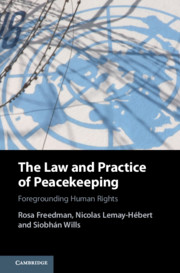Book contents
- The Law and Practice of Peacekeeping
- The Law and Practice of Peacekeeping
- Copyright page
- Contents
- 1 Introduction
- 2 A Political History of UN Involvement in Haiti
- 3 Integrating Human Rights Norms into UN Peacekeeping Practice
- 4 UN Immunities and Human Rights
- 5 The Cholera Epidemic
- 6 Sexual Exploitation and Abuse
- 7 UN Peacekeepers’ Use of Deadly Force to Maintain Law and Order
- 8 Conclusion
- Index
5 - The Cholera Epidemic
Unintended Consequences and Implications
Published online by Cambridge University Press: 28 May 2021
- The Law and Practice of Peacekeeping
- The Law and Practice of Peacekeeping
- Copyright page
- Contents
- 1 Introduction
- 2 A Political History of UN Involvement in Haiti
- 3 Integrating Human Rights Norms into UN Peacekeeping Practice
- 4 UN Immunities and Human Rights
- 5 The Cholera Epidemic
- 6 Sexual Exploitation and Abuse
- 7 UN Peacekeepers’ Use of Deadly Force to Maintain Law and Order
- 8 Conclusion
- Index
Summary
The UN’s involvement in Haiti will long-be remembered by the introduction of cholera by peacekeepers in the aftermath of the 2010 earthquake. To many Haitians and observers, the cholera crisis and UN failures to provide justice for victims is emblematic of the UN presence and legacy within the country. This may of course be unfair when considering the many positives for which the UN and its personnel are responsible, but the scale of the cholera crisis, and the refusal of the UN to clear up its own mess, is arguably one of peacekeeping’s starkest wrongs since the military failures to protect humans from genocide in Rwanda and in the Former Republic of Yugoslavia.
- Type
- Chapter
- Information
- The Law and Practice of PeacekeepingForegrounding Human Rights, pp. 66 - 88Publisher: Cambridge University PressPrint publication year: 2021

